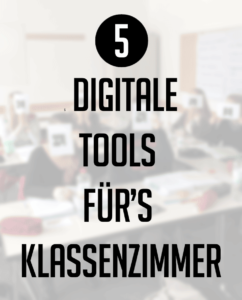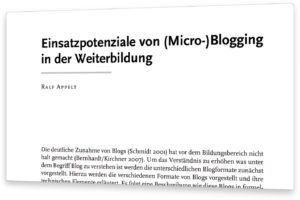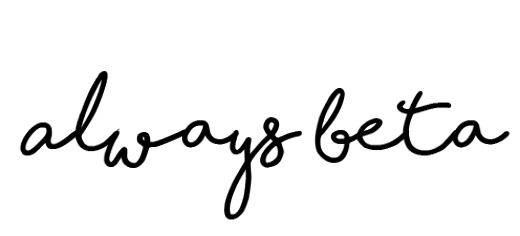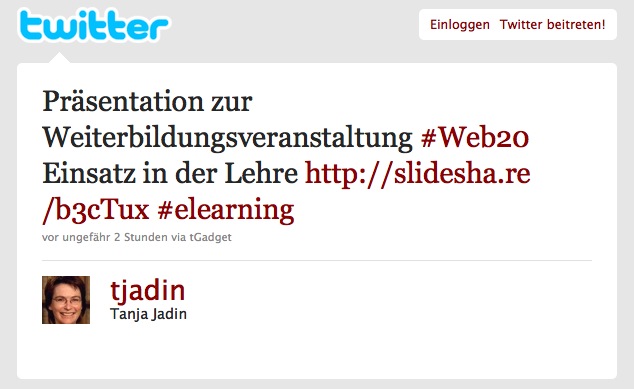 In diesem Blogbeitrag möchte ich fünf einfache Tools vorstellen die ich in den ersten vier Wochen meines Referendariats bereits genutzt habe. In den Seminaren haben immer wieder mal Kolleginnen und Kollegen Interesse bekundet, aber irgendwie fehlt es dann oft an der Zeit die einzelnen Tools in Ruhe anzuschauen.
In diesem Blogbeitrag möchte ich fünf einfache Tools vorstellen die ich in den ersten vier Wochen meines Referendariats bereits genutzt habe. In den Seminaren haben immer wieder mal Kolleginnen und Kollegen Interesse bekundet, aber irgendwie fehlt es dann oft an der Zeit die einzelnen Tools in Ruhe anzuschauen.
Deshalb gibt es hier nun diese Übersicht. Weiterlesen
Schlagwort: microlearning
Was ist eigentlich Microlearning?
Im Rahmen des Lehrbuches L3T wurden bereits ein paar Videos erstellt. Das neueste zeigt Martin Lindner der erklärt was eigentlich Microlearning ist.
Besser kann man es kaum sagen – jedenfalls nicht als Microcontent 😉
Wie alles begann…
In der Sidebar des Seminarblogs zur Lehrveranstaltung „Web 2.0 und die Gesellschaft“ (WS 2010/11, AW 448, Techniksoziologie) an der Beuth Hochschule für Technik in Berlin von der Dozentin, Dr. Ilona Buchem bin ich auf folgenden Tweet von Tanja Jadin gestoßen.

In ihrem Tweet verweist Tanja Jadin auf eine Präsentation die sie erstellt hat. Diese kann auf der Plattform slideshare direkt angesehen, oder wie in diesem Fall in andere Seiten eingebunden werden. Praktischer Weise beschäftigen sich das Blog von Ilona Buchem, als auch die Präsentation von Tanja Jadin mit einem Thema das auch mich beschäftigt und in unserem Seminar elementarer Bestandteil ist.
3 Gründe für eLearning 2.0
Auf Grund des oben beschrieben Erlebnisses und ähnlicher Erfahrungen beschäftige ich mich seit längerem mit der Frage wie social Media zur Unterstützung von Bildungsprozessen genutzt werden kann.
- Das erste was mir gut daran gefällt ist, das die Inhalte in Blogs, bei Slideshare und den vielen weiteren Diensten so leicht zugänglich sind. Ich musste auch keine Suchmaschine bemühen um an diese Inhalte zu kommen.
- Ich habe stattdessen eine Anzahl von Menschen denen ich bei Twitter folge. Sie sind alle Mitglied in virtuellen Communities die mich interessieren, z.B. “eLearning 2.0”. Die Präsentation hätte, das behaupte ich einfach, früher oder später ihren Weg zu mir gefunden. Damit hätten wir schon den zweiten Grund der mir diese Art an Lernressourcen zu kommen sympathisch macht.
- Ebenfalls ein wichtiger Punkt ist für mich, dass ich diese Inhalte nicht nur rezipieren kann, sondern mit den Autoren und anderen Rezipienten in einen Austausch kommen kann, mich einbringen kann und ebenfalls auf einfache Art und Weise Inhalte bereitstellen kann.
Ich freue mich auf das kommende Semester, um dort mit Studierenden in Hamburg und Köln im Seminar “Lernen im social web” diese Aspekte und das Drumherum ein wenig unter die Lupe zu nehmen.
Artikel “Einsatzpotenziale von (Micro-)Blogging in der Weiterbildung” online verfügbar

Endlich ist es so weit. Mein Artikel “Einsatzpotenziale von (Micro-)Blogging in der Weiterbildung” steht komplett zum Download bereit. Eigentlich hätte der Artikel schon im Mai verfügbar sein sollen, aber leider gab es ein paar Verzögerungen. Auch an dieser Stelle sei noch einmal auf die Rezension des Artikels von Matthias Rohs hingewiesen.
Erschienen ist der Artikel in:
Roland Holten/Dieter Nittel (Hg.)
E-Learning in Hochschule und Weiterbildung. Einsatzchancen und Erfahrungen.
W. Bertelsmann Verlag, Bielefeld 2010
ISBN 978-3-7639-3342-6.
Wer die Literaturangaben für den Artikel direkt übernehmen möchte:
Appelt, R. (2010). Einsatzpotenziale von (Micro)Blogging in der Weiterbildung, In R. Holten & D. Nittel (Hrsg.), E-Learning in Hochschule und Weiterbildung: Einsatzchancen und Erfahrungen (S. 147-162). Reihe Erwachsenenbildung und lebensbegleitendes Lernen, Bielefeld: W. Bertelsmann Verlag
 Download des Artikels
Download des Artikels
Blogging in educational contexts – My MA Thesis are online available now
 ((Image Source: britbohlinger bei flickr))
((Image Source: britbohlinger bei flickr))
Last month I completed my masterthesis and graduated in the international MA Program ePedagogy Design – Visual Knowledge Building. You can access all the content online within my thesis (blog) and you can also download the linear pdf file.
Why am I sharing the thesis?
 I won’t call it a excellent MA Thesis nor the evaluators did. It is a product which has to fulfill certain formal criteria within a formal learning program. And much more important it needs to be finished one day and there was a specified deadline. In my opinion some theories should be extended and much more connected with the practical suggestions. But I couldn’t invest more time into this work before the date when it has to be submitted. I’d say the text is always beta and a good startingpoint and overview on blogging in educational contexts. ((Image Source: http://www.flickr.com/photos/pixel-sallo/3617083357/))
I won’t call it a excellent MA Thesis nor the evaluators did. It is a product which has to fulfill certain formal criteria within a formal learning program. And much more important it needs to be finished one day and there was a specified deadline. In my opinion some theories should be extended and much more connected with the practical suggestions. But I couldn’t invest more time into this work before the date when it has to be submitted. I’d say the text is always beta and a good startingpoint and overview on blogging in educational contexts. ((Image Source: http://www.flickr.com/photos/pixel-sallo/3617083357/))
I used a lot of online resources. That was only possible because people did’nt mind to share they thoughts and findings.
I’d like to share my thoughts and findings too. I don’t like to keep it just on my computer because it is not the perfect work. May be you have additions on it, just write comments or you can use the references or anything else from my work to enhance yours. You’re welcome!
There is a free registration needed to view the whole work.
Why am I using a blog as container for my thesis?
Of course one reason is that the topic of my work deals with blogging and that blogs could be used as LCMS, so why do not use a blog system to publish the work. Another aspect is that the permalinks, trackbacks and comment features might help you to have an easier way to give feedback or hyperlink and reference specific parts online directly. One more reason is that e.g. the tags are additional navigation elements compared to the linear pdf version.
Thanks…
I just hope you can make use of my work. And hey, thanks for sharing!
Pedagogical Media Theory – Blogging and its possible relation to education
Description for my Seminar in Summer 2009:

Since Blogs are an easy way to publish information to the web the use of them is still increasing, even in educational settings. The question for this seminar is how could blogging and microblogging be used efficently for teachers and learners. What are traps and what are benefits in using those technologies for learning processes? What kind of understanding of the relation between teacher and student are common and meaningful if social software is used in education? We will deal with different learning theories and how they adapt to blogging. You will also try blogging and microblogging during the seminar to discover relevant aspects for judging about the relevance and to take didactical aspects in account for future learning arrangements.
Links for this Seminar will be bookmarked at delicious with the tag: seminarappeltsose2009
This Course will take place between Apr. 7th 2009 and Jul. 14th 10:00 – 12:00 h (cet).
Microlearning 2008
Thanks to Twemes and Martin Ebners Twitter Messages I get at least a Impression of what is going on at the Microlearning Conference 2008 in Innsbruck/Austria.
E.g. Judy Breck [Blog 1, Blog 2] with her Keynote about the Cloud in Education she states that:
Delivering the cloud to individual students is the key mobile role for education.
The node junction between web assets is the most important component of online learning.
That sounds a lot like George Siemens idea of Connectivism to me.
In her Keynote she presents a
3 Step Plan to complete before 2012
- No more pencils – mobile and connectivity to all school age kids
- No textbooks – schools use open educational resources online
- No more searching gobbledygook – educators and mobilists focus on learning content
Martin Ebners presentation titled “Has the end of chalkboard come? A survey about the limits of Interactive Pen Displays in Higher Education” could be a nice base for evaluating interactive whiteboards within our ePush Project.
![]()
That’s it so far. For me it is nice to get these impressions. Thanks a lot to the contributers!



